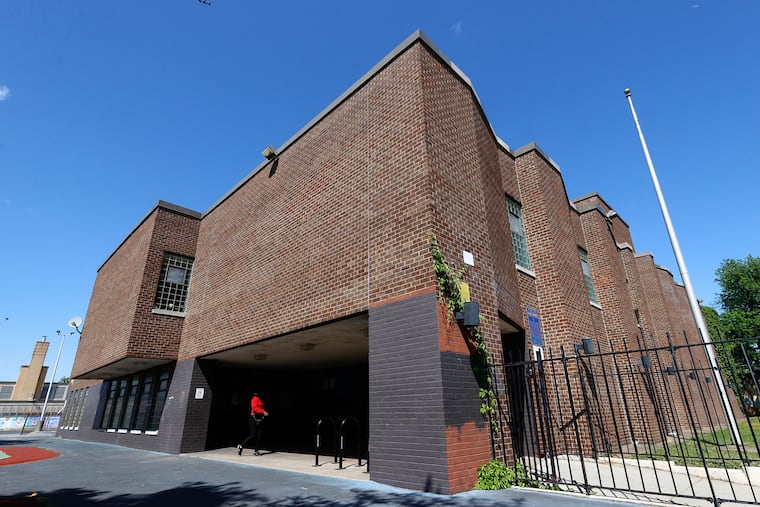Sayre pool in West Philly to reopen after city and school district strike a $15 million deal
“The pool to me is an analogy for what happens when the system works,” said school board president Reginald Streater.

The long-closed Sayre-Morris pool has a clear path to reopening.
After a long public battle, the Philadelphia school board voted Thursday night to sign a deal with the city to revive the Olympic-sized indoor pool at 59th and Spruce Streets, which has been closed since 2017.
As part of the agreement to reopen the district-owned facility adjacent to Sayre High School, the city pledged $3 million, with the state promising an additional $500,000 and City Councilmember Jamie Gauthier also contributing $500,000 from her district’s capital funds. The district will pick up about $11 million of the tab.
» READ MORE: ‘Should pools be our priority?’ West Philly pool becomes a battleground between community, city, and school board
Though the West Philadelphia pool will remain district property, the city’s recreation department will staff and run the building and all pool-related programming, as well as take on pool maintenance and upkeep. The school system would be responsible for any large capital improvements to the building and have right of first refusal to use the pool for part of the year.
It’s not yet clear when Sayre pool might reopen.
Mayor Jim Kenney, in a letter to the school board, said its action was “a major step forward in allowing students and the community to benefit from access to the pool and programming.”
Gauthier, who told the board the pool was the “crown jewel of Cobbs Creek,” was elated after the deal passed.
“To get a fully-improved pool with public access for the community is huge,” Gauthier said Friday.
It’s a boost not just for West Philadelphia, but for the rest of the city, the councilmember said; the city has had difficulty attracting lifeguards to staff its public pools, in part because the only place to train them is at the single indoor city pool at Abraham Lincoln High School in the Northeast. Sayre would serve as additional training facility.
Reopening Sayre helps “us get out of this continuous loop of struggling to open pools every summer,” said Gauthier.
Sayre Pool was a flashpoint for years. Community members campaigned hard for its return to use, and a tentative deal was struck during William R. Hite Jr.’s superintendency.
But in February of 2022, the school board decisively voted down a plan to spend $10 million for its reopening. At that point, there was no city agreement on the table, and school leaders were loath to commit.
“We have huge capital needs across the district,” then-school board president Joyce Wilkerson said at the time. “While I realize the community has been waiting a long time and this may be a very deserving project, I think it is a mistake for us to consider this without having it considered in the context of our broader capital program.”
The rejection spurred advocates to push harder around aquatics equity. Members of the community would show up to monthly school board meetings and talk about how pools give young people a safe outlet in a city beset by gun violence; about the job opportunities and life skills generations of Philly kids got from public pools.
The district still does not have a new facilities master plan, and its capital needs have not changed — in fact, they have gotten more serious, with damaged asbestos closing six buildings so far this school year — but the political calculus around the pool has shifted.
School board president Reginald Streater said the community urgency around reopening the pool impressed the board, and that the commitments from other public agencies made it happen. Think of the partnership as what local control of district schools is supposed to look like, he said.
“The pool to me is an analogy for what happens when the system works,” Streater said. The city-district deal comes at a crucial moment; for months, the two have been publicly feuding, with the school system suing the city over a law that gives Philadelphia more oversight over school buildings, and City Council publicly demanding more answers on facilities from district leaders.
The board voted down spending $10 million on the Sayre pool last year; the bill rose, Streater said, because it wouldn’t make sense to invest significant funds on a pool that did not match the dilapidated building that housed it.
“Why would you put nice rims on a hooptie?” Streater asked. The community deserves better, he said.
Charisma Presley, an advocate with Friends of Philly Aquatics, was thrilled at the outcome. Presley, who lives in Germantown, often brought her three children to board meetings to lobby for pools. Though Presley’s neighborhood indoor pool, Pickett, remains closed, her group is optimistic the Sayre reopening opens doors for other swimming opportunities in the city.
“This is government working,” Presley said. She was particularly heartened, she said, by a surprise: Superintendent Tony B. Watlington Sr.’s strategic plan, introduced this week, included a pilot of learn-to-swim programs in some Philadelphia elementary schools.
“To see that he was actually listening, that resonated with us,” Presley said. “He didn’t just hear us, but he listened, and he found a way to incorporate it in the curriculum. We are so hopeful for what will become.”